Cambodia is one country famous for having numerous Non-Governmental Organizations (NGOs), orphanages, and English schools, many of which rely on the support of foreign volunteers as teachers.
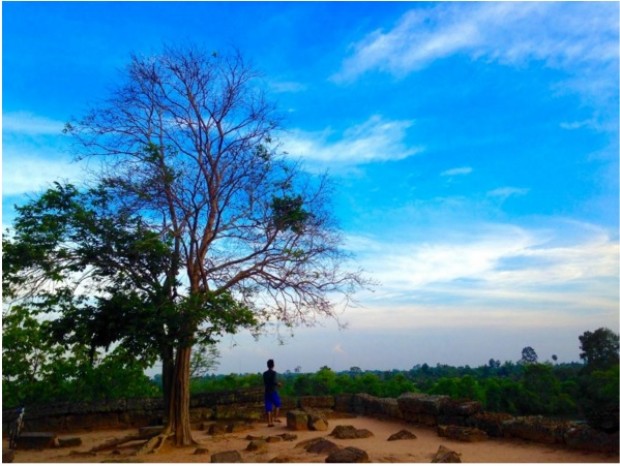
During my travels, I spent a total of five short weeks teaching at an English school in Siem Reap. Here are seven things I learnt from being a volunteer teacher in Cambodia.
Also read: Why Volunteer Abroad?
1. You may have to build your own classroom
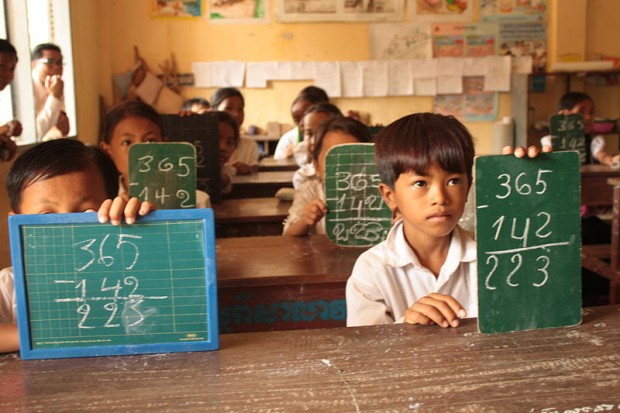 Image credit: Wikimedia
Image credit: Wikimedia
In the school I taught at, there were classes for Kindergarten students, and students from Grade One through Grade Seven. In total, we must’ve had approximately 200 students in the school. As I was taking a small class of seven students – all of them in Grade Five, priority for the classroom usage was not given to me.
I had to adapt by creating an outdoor classroom for them using a small rectangular table, and a few red plastic chairs. Add one large whiteboard propped up on a half broken chair, and voila, you have an outdoor classroom!
While it took me a couple of days to get used to constantly perspiring outside in the heat while conducting classes, I soon began to love this “makeshift classroom” – even more so than having a proper indoor classroom.
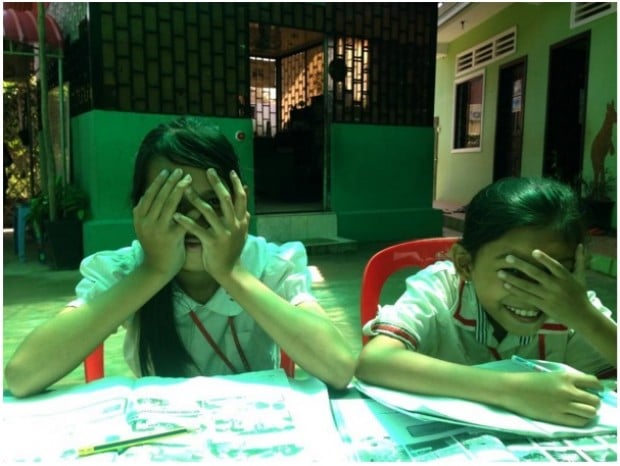
One of the main reasons was that there were lesser mosquitoes in the outdoors as compared to the indoor classrooms. Thus, I got bitten a little bit lesser than my fellow volunteer teachers.
The other benefit to conducting classes in an outdoor classroom is the ability to create activities and games suited to the outdoors! With the amount of space I got – the whole courtyard was mine – I had endless ideas for games and activities during class time.
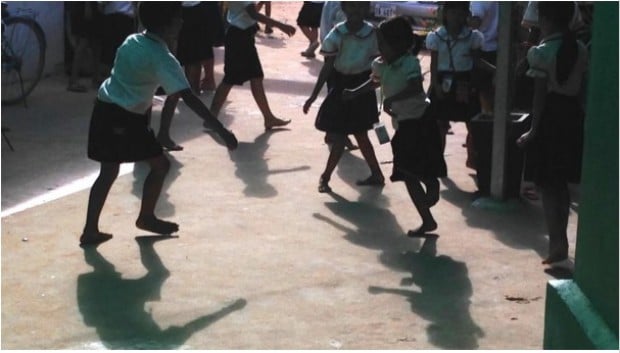
I would get the kids to race from one end to the other to see who could score highest points, and conduct morning exercise routines if some of them felt too tired to be sitting still in class (think Monday morning blues).
Setting up an outdoor classroom every morning turned out to be a great idea after all!
2. The children start to adore you after just a week of teaching, and you can’t help but love them too
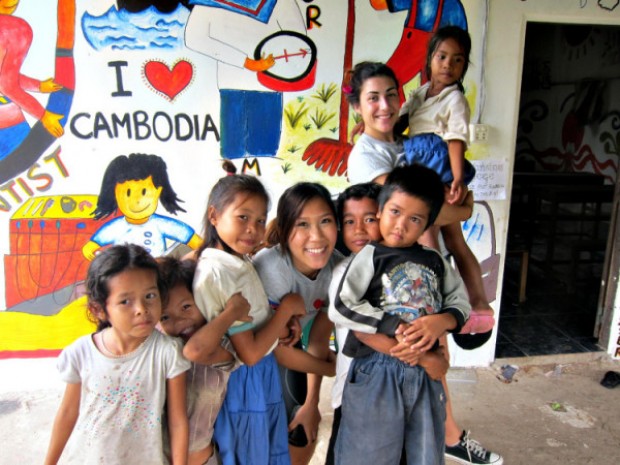 Image Credit: Travelettes.net
Image Credit: Travelettes.net
In a place like Siem Reap, where volunteer tourism is endless, many people come and go as volunteer teachers. Usually the minimum requirement is to stay for a month, but some leave after just two weeks.
I started to see how this affected the students, as they constantly had to get used to changing teachers and adapting to each new volunteer’s teaching style. My guess is that since they already know that you won’t be staying for long, they just want to get to know you and enjoy your teachings as much as they can.
My students were slightly hesitant with me on day one, but after a week, they were hugging me to say goodbye after class ended each day. Each time there was a volunteer farewell in the school, I would get asked when I was leaving – presumably so that the kids could prepare themselves for it.
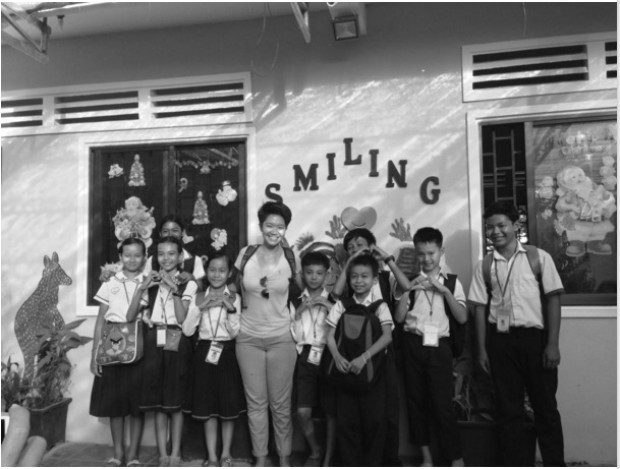
The feeling of being loved by your students is great, until the day comes when it’s time to say goodbye – cue multiple hugs and holding back of tears.
3. The students are eager to learn even without sufficient supplies.
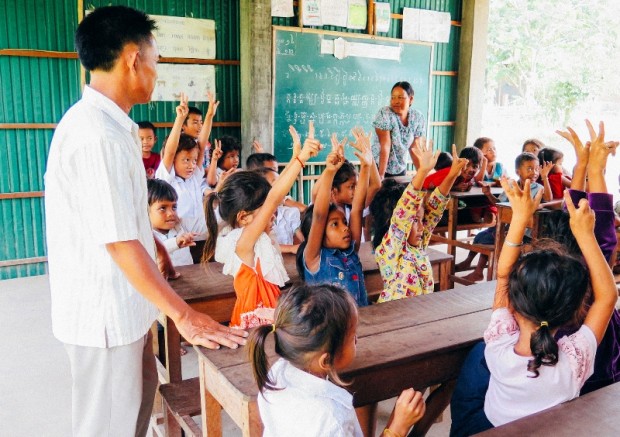 Image Credit: Cambodia Centre for the Protection of Children’s Rights
Image Credit: Cambodia Centre for the Protection of Children’s Rights
At an organization that relied heavily on charity to continue its operations, having enough textbooks to pass around to all the students in class was always a struggle. Often times, one textbook was shared among three to four students. Despite this situation of scarce textbooks, the kids seemed to always be excited for class and would be vying to be chosen to read aloud the stories from each chapter – an activity I loved because I could see each one of them focusing real hard to read it right.
Seeing this made me appreciate the resources we have for schools in Singapore, where we get to have individual textbooks per student, although, we don’t get quite the same level of enthusiasm in Singapore classrooms.
As I have learnt during my travels, sometimes the ones who have less, are richer in life.
4. Anything can happen, so make sure you plan your lessons
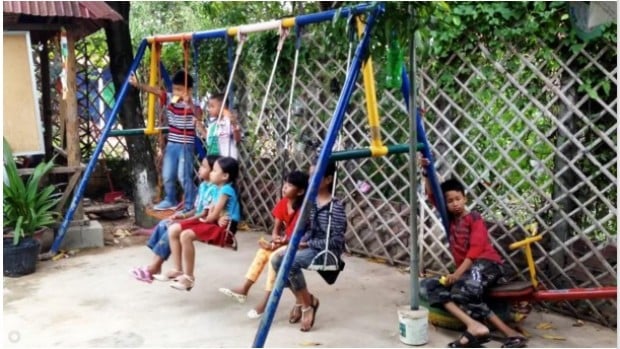
I was extremely contented with my small class of Grade Fivers and having the whole courtyard space to ourselves, when the day came that I was told to combine both Grade Four and Five into one classroom, as the teacher for the Grade Four class did not turn up that day (I’d blame Siem Reap’s street food for that).
Thankfully, I had a full session’s activities planned for my students in Grade Five, so all I had to do was assign the work to my lovely independent Grade Fivers and try to plan an impromptu lesson for Grade Four.
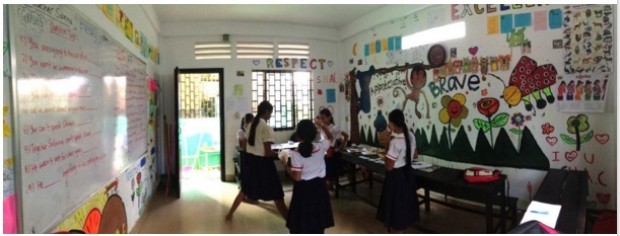
Believe me, my mind was in a bit of a mess that day! Knowing I had lessons planned for Grade Five helped, because then I only needed to get busy with Grade Four. Still, it wasn’t easy juggling two classes at one go. What I learnt that day? Be prepared for anything and plan your lessons in advance!
Also read: 5 Ways to be a Better Traveller
5. You get to cycle to school everyday
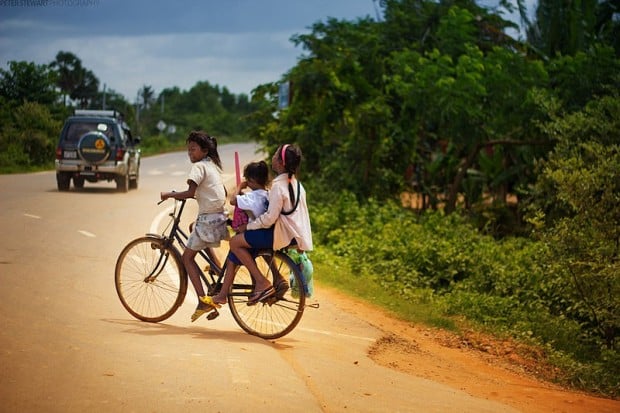 Image Credit: Wikimedia
Image Credit: Wikimedia
Every morning, we would get up early, have a small breakfast, and cycle to school for the morning classes. Sometimes we would bump into our students en route to school and have a nice cycle together. It’s a great start to the morning and great exercise too. If you’re lucky, you get to cycle under the monsoon rain – Siem Reap has a lot of dirt roads, especially the ones leading to small English schools, so be sure to watch for those potholes!
6. Teaching is no easy feat.
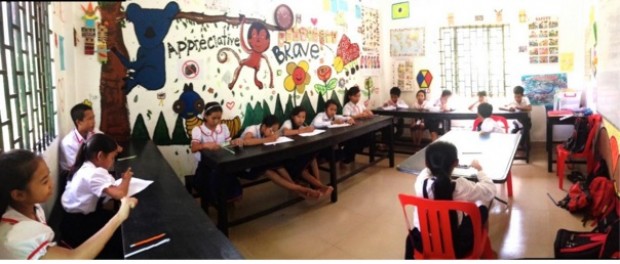
By the time I got to Cambodia, I had already done two volunteer teaching stints, one in India and the other in Vietnam. So I was well aware that teaching English to non-native speakers is not quite as easy as one might think, and my Cambodian experience was no exception.
One of the things many volunteers neglect to think about – and I admit I also fell prey to this trap – is that you are imparting important fundamentals and life skills to the children you teach. A holiday break quickly becomes serious business and responsibility, because you as a volunteer will help shape lives.
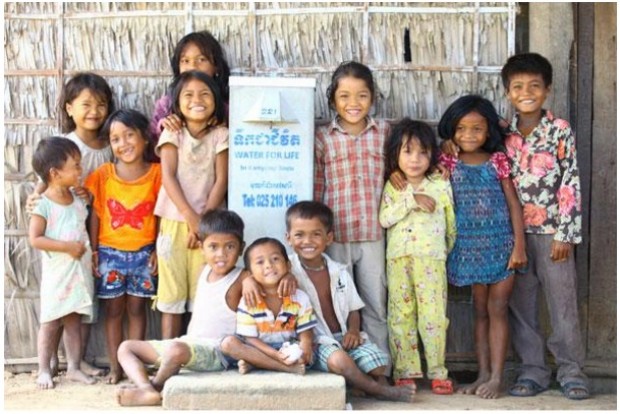 Image Credit: Singapore International Volunteers
Image Credit: Singapore International Volunteers
For most people, teaching Basic English is perceived as an easy task, but when it comes to non-native speakers, I beg to differ. One of the main difficulties was of course, the language barrier.
As native speakers of the English language, we might not notice how we are using our words in our sentences, because it comes naturally to us. When it comes to teaching non-native English speakers how to use a new word in the right grammar form, things get a little bit tricky. I had to think of the simplest ways possible to help my students understand certain words. Some days, we would spend the whole lesson just going through new vocabulary.
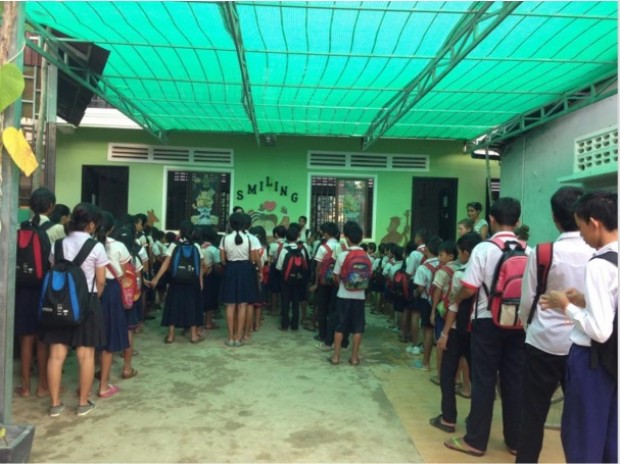
The other challenge was that the students would speak to each other in Khmer during class time, and may even speak to you in Khmer if they’re feeling cheeky. There are a few ways of dealing with this, but I found simple imitation to work best with my mischievous boys in class.
Then of course there’s the usual – classroom management (especially with a class full of mischievous boys), dealing with tired children, restlessness, arranging classroom activities and games for interactive learning, getting all the students to pay attention, and most of all, to be quiet in class.
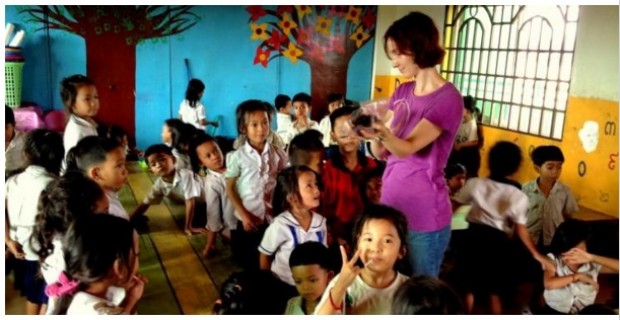 Image Credit: Ubelong
Image Credit: Ubelong
Combine these with Cambodia’s monsoon climate – which is either always hot and humid (much like Singapore, but hotter and more humid) or extremely wet from the rain – and the mosquito problem, and you’ll find that keeping your calm while teaching isn’t quite an easy feat.
At the end of the day, if there’s one thing I can say I’ve learnt, it’s that you end up doing more learning than teaching.
7. Know the purpose and impact of your volunteer work
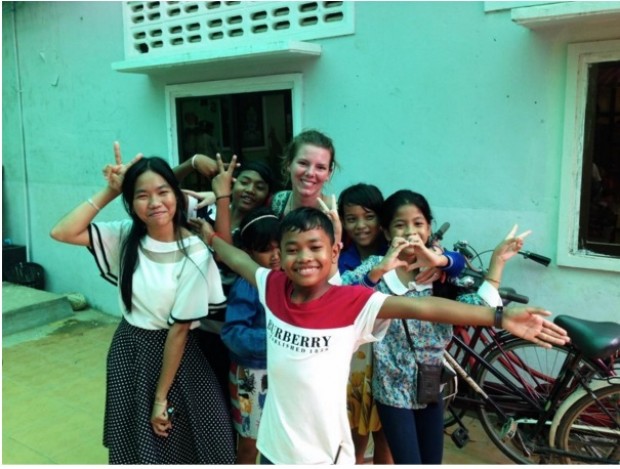
The last thing I want to share is this: Know the purpose of your volunteer work and the impact that you aim to make on those you interact with. Many people are engaging in volunteer travel these days (especially so in Cambodia) and many do not know how it impacts the society.
A lot of the controversy around volunteer tourism in Cambodia is that foreigners volunteer at orphanages by offering their help or by teaching English at these orphanages. However, what people don’t know it that many of these Cambodian orphanages exist only to cater to foreign tourists. Many of the kids at these orphanages are in fact, not orphans and have at least one living parent.
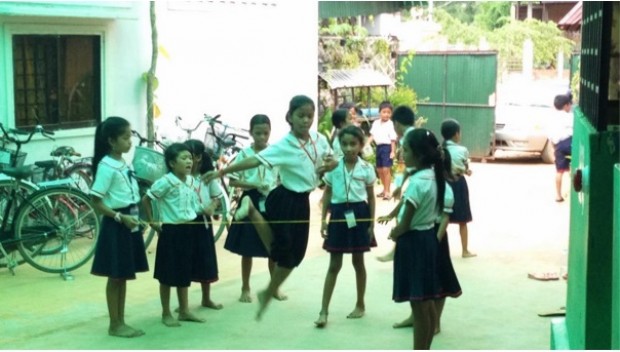
My Cambodian volunteer experience was with a school and not an orphanage but some of these points were extremely relevant to me too. Most of the time, we western tourists think we can “make a difference” by going to a “third world country” and helping them become more like the modern world.
But one of the biggest lessons I learnt about volunteering in a developing country is that you have to learn before you can help.
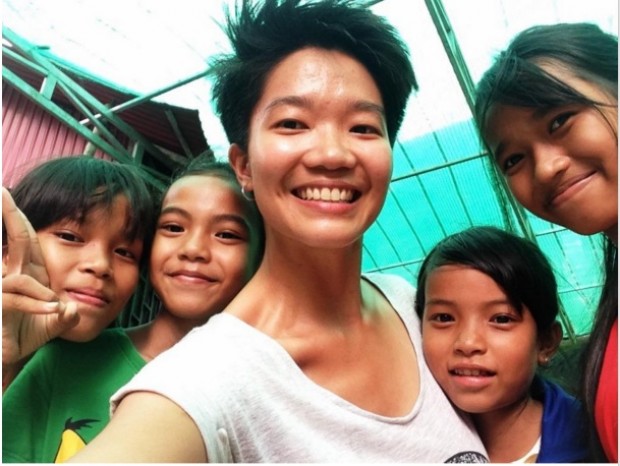
Even for me, five weeks of teaching was not enough to make a long-lasting impact on the students. I met many other volunteers who stayed just for two weeks and one can only imagine how this constant change of teachers and no proper lesson planning affected the students’ pace of learning.
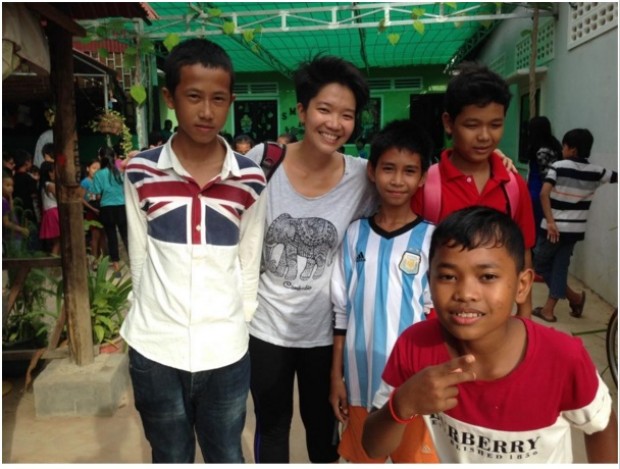
So before you pack up your bags and go for that two week volunteer teaching project, I urge you to first do some extensive research – some informative websites like Friends International, Cambodia’s leading child-safety organization, has plenty of information on the topic on their When Children Become Tourist Attractions site. You can also find out more from Daniela Papi, founder of PEPY, an educational development NGO. She dedicates her time to share with others about voluntourism in Cambodia on her blog, Lessons I Learned.
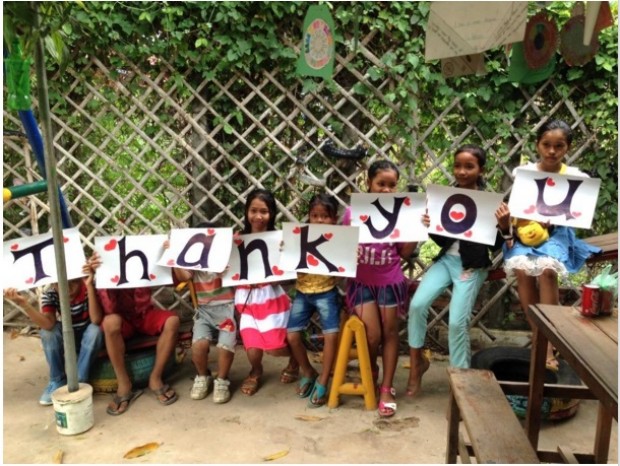
Volunteer travel can be wonderfully fulfilling, and sometimes even life changing. But know that this shouldn’t just be something you want to do so you can tick it off your bucket list. I hope that after sharing this, some of you will think seriously about the kind of impact you wish to make while participating in volunteer travel, instead of just posting selfies with Cambodian children on your Facebook page.
Till then, happy travels!




